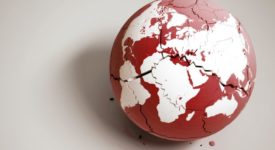At the end of November 2017, Africa’s second longest-serving leader, Zimbabwean President Robert Mugabe was forced out of office in a coup d’état but his toppling is not surprising given the serious democratic deficit that the country had been experiencing for decades. Still, the coup d’état did not send a positive signal at a time when the African Charter on Democracy, Elections and Governance (ACDEG), the first legally binding regional tool in the promotion and protection of democracy, is commemorating a ten-year anniversary since its establishment in 2007. ACDEG is a platform for African countries to assess whether democracy has taken off throughout the continent.
It is honest and accurate to say that democracy in Africa is in jeopardy of being trapped in the “electoral fallacy” with regular elections taking place. Regional protocols committing state-parties to higher forms of democracy are in place but performance has been occasionally insufficient. Moreover, some recent engagement has shown the unwillingness of African leaders to commit to anything close to a legally binding framework. As a result, democracy is not becoming sufficiently diffused and rooted in the modes of government.
A better way of promoting democracy in Africa lies beyond the push for greater institutionalization. This, in reality, means accepting a new lens, taking into consideration variations stemming from within African states as well as differences in the evolution from Western forms of democracy. The state of democracy in Africa could best be captured by the metaphor of a ‘glass half full/half empty’. The ACDEG lays out ambitious processes in place for sanctions in case of member states’ failure to adhere to its provisions. Its ambitions notwithstanding, the discordant journeys the Charter had travelled to its 10-year anniversary and beyond attest to Africa’s chaotic democratic trajectory.
First, three out of the eight recognized Regional Economic Communities of the African Union – the Economic Community of Central African States (ECCAS), the Communauté des États Sahélo-Saheriens (CEN-SAD) and the Arab Maghreb Union (AMU) – do not have separate tool or constitutive documents with specifics on democracy, elections, or governance. Conflicts, politics and religions challenge exceptions and differentiations in modes of governance in Mauritania, Chad, Niger, Libya and Sudan. Different expectations help explain the state of democracy in in these peripheral zones.
Second, the signs of democratic deficit are also manifested during elections that are often accompanied by violence and death. At elections, protests and manifestations, social media and Internet blackouts are also anti-democratic impulses. All of these point out to the malaise of African democracy. Third, democracy has been set aside as a priority of the second order since conflict management is always playing a prime role in the rise of religious extremism. Western players ordering the fight against terrorism are also undoubtedly contributing to the democratic recession in some parts of the Horn of Africa and the Sahel.
The democracy in Africa is in troubled conditions. The normative conviction about its intrinsic merits is apparently under stress. There are conflicting signals and divergent views about term-limits and the role of civil society as firewalls in democratic governance. The very fact that nineteen African leaders have ruled their countries for more than twenty years hardly opens up the space for democratic norms diffusion and democratic values convergence within the African Union.
‘Democracy in Africa: Reversing Backsliding After Ten Years of the African Charter on Democracy’ – Editorial by Alfredo Tjiurimo Hengari – Institut français des relations internationales / IFRI.
(The Editorial can be downloaded here)







